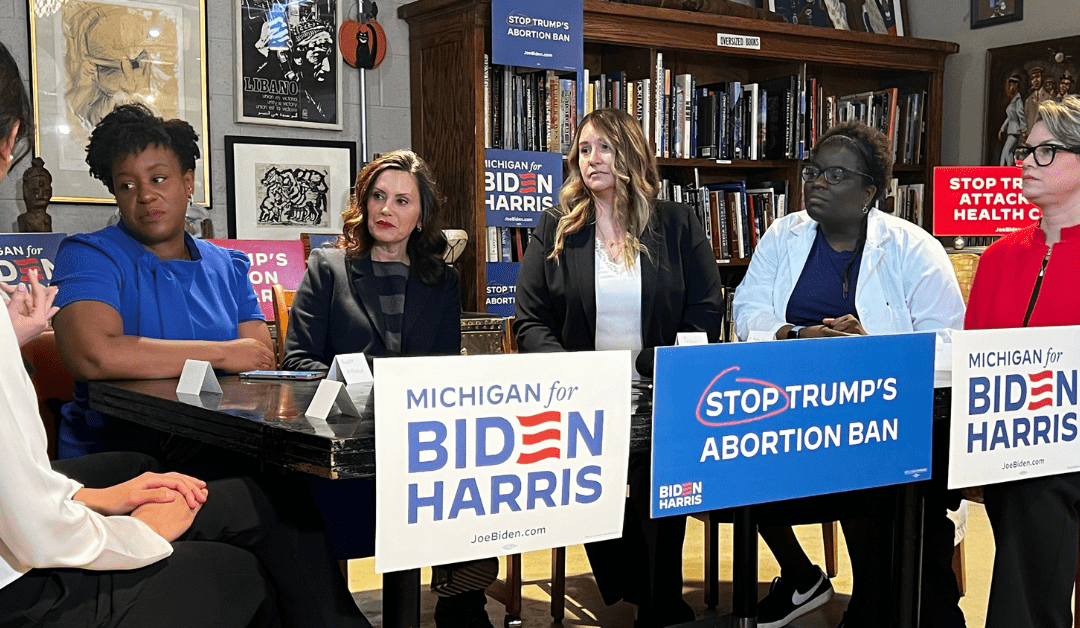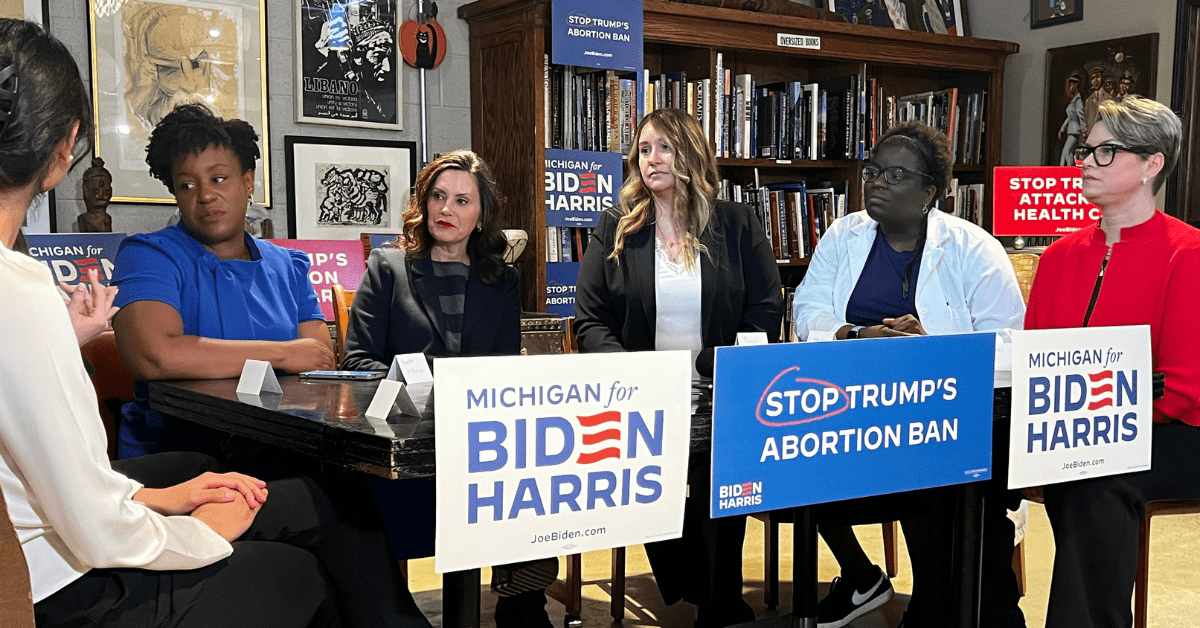
BY KYLE DAVIDSON, MICHIGAN ADVANCE
MICHIGAN—Gov. Gretchen Whitmer released her sixth executive budget recommendation on Wednesday, drawing praise from environmental advocates for supporting clean energy and water infrastructure, mixed responses on housing investments and calls for more funding for transit.
In addition to allocating funds to operations, projects and initiative within the state’s various departments, Whitmer’s newly released recommendations for the $80.7 billion Fiscal Year 2025 budget included proposals to draw in additional funding for the state by raising the fee for disposing waste in a landfill from $.36 a ton, to $5 a ton. According to the State Budget Office, raising the fee would put Michigan on par with the average waste disposal fee in the Midwest, and would bring in roughly $80 million in ongoing revenue.
Whitmer also proposed making the state’s recreation passport program—which is required for motor vehicles to access state parks, recreation areas and boat launches, and funds the maintenance of these sites—an opt-out program rather than the current opt-in program. This was debated when lawmakers passed legislation for the programs more than a decade ago, but the opt-in structure was adopted to win enough Republican votes.
By making it so residents are automatically enrolled with an opt-out option during vehicle registration, the state could draw in an additional $21 million for improvements in the state park system, according to a brief from the State Budget Office.
When comparing Whitmer’s Fiscal Year 2025 proposal to the state’s current budget that runs through Sept. 30, her new recommendation boosts funding for the Department of Environment, Great Lakes and Energy (EGLE) by more than $52.5 million, proposing more than $1.1 billion. It also pares back funding for the Department of Agriculture and Rural Development (MDARD), and the Department of Natural Resources (DNR).
In the FY 2024 budget, lawmakers approved more than $168.2 million for MDARD and $572 million for the DNR. The recommendation for Fiscal Year 2025 includes $143.8 million for MDARD and $542.5 million for the DNR.
Under the FY 2025 recommendation, MDARD would receive just under $30.4 million for environment and sustainability efforts, including promoting soil health and regenerative agriculture, maintaining an agriculture climate resiliency program, and supporting pollution prevention programs.
Ben Wickerham, agriculture program director for The Nature Conservancy in Michigan, applauded Whitmer’s support for agricultural sustainability in her recommendations.
“At The Nature Conservancy, we’re proud to support investments and enhancements in agricultural sustainability programs that will help drive innovation, bolster farm resiliency, promote food security, and help protect our state’s vital natural resources,” Wickerham said.
“We look forward to working with the Michigan Department of Agriculture and Rural Development, Gov. Gretchen Whitmer and the Legislature over the next several months as the budget takes shape,” Wickerham said.
The Attorney General’s Office would receive $2.42 million from EGLE for operations.
The Department of Health and Human Services (DHHS) would also receive $20.5 million for PFAS and environmental contamination response, and is instructed to allocate $4.75 million of its local health services funding to grants for local public health departments supporting PFAS response and other activities on emerging public health threats.
The proposal also set aside $2.9 million for the DNR’s Great Lakes Restoration Initiative, as well as $7.1 million for invasive species prevention and control. The Department could also receive $48.4 million for wildlife management and $35.4 million for fisheries management, compared to the FY 2024 budget’s $47.7 million allocation for wildlife management and its $34.5 million appropriated for fisheries management.
Under Whitmer’s FY 2025 recommendation, EGLE’s water resources division would receive $86.4 million including $316,100 for fish contaminant monitoring, and $4.08 million for its nonpoint source pollution prevention and control project program, which helps address pollutant carried into bodies of water by rain, snowmelt, wind or excessive runoff.
EGLE would also receive $37.2 million for its Air Quality Division, $116.9 million for its Remediation and Redevelopment Division, and more than $20 million for underground petroleum storage tank cleanup.
The FY 2025 budget recommendation also included $40.2 million for EGLE’s Drinking Water and Environmental Health Division and more than $449 million for water infrastructure, including $13.6 million for lead service line replacement. There is also a $10 million one-time provision for EGLE’s water infrastructure initiative and a $35 million one-time provision for drinking water infrastructure.
Clean fuels and environmental advocates also spotlighted one-time appropriations including $20 million to support transitioning the state’s fleet to emissions free vehicles, and $25 million to support clean charging infrastructure.
“We are grateful for Gov. Whitmer’s continued support of cleaner fuels and electric vehicles,” Jane McCurry, executive director of Clean Fuels Michigan said in a statement.
“Clean Fuels Michigan and our members stand ready to work with the legislature to ensure these programs are fully funded in the budget. These investments are necessary to secure Michigan’s leadership in advanced mobility, grow good-paying jobs in the clean fuel sectors, and allow more Michiganders and Michigan fleets to benefit from the improved air quality and cost savings of cleaner vehicle technologies,” McCurry said.
Whitmer also recommended The Department of Technology Management and Budget (DTMB) receive $1 million to transition the state fleet to electric vehicles, alongside a one-time allocation of $2 million in support of the same goal.
She also recommended the state offer a rebate for new vehicle purchases, with union-made electric vehicles eligible for a $2,500 rebate and non union-made electrical vehicles eligible for $2,000. Non-electric, union-made vehicles would qualify for a $1,500 rebate, while non-electric, non union-made vehicles would qualify for $1,000.
Alongside support for electric vehicles, the budget also included additional funding to support the transition of jobs working in fossil fuel industries to working in clean energy. Whitmer’s FY 2025 budget recommendation allocates $5 million for 20 full-time positions in the Department of Labor and Economic Opportunity’s (LEO) newly created Community and Worker Economic Transition Office.
This office would also receive $10 million from the General Fund as a pilot fund, if lawmakers approve recommendations for an FY 2024 budget supplemental.
The Michigan League of Conservation Voters also highlighted $5.8 million in funding to support the implementation of Michigan’s new 100% clean energy standard.
“Clean energy will lower costs, clean up our air and water and help improve public health, which is why it’s great to see Gov. Whitmer invest in implementing Michigan’s newly enacted, nation-leading 100% clean energy law,” Nick Occhipinti, government affairs director for the Michigan League of Conservation Voters said in a statement.
While the Ecology Center highlighted the inclusion of funding to build or rehabilitate housing in Michigan to ensure energy efficient and affordable stock, members of the Michigan Environmental Council said these efforts were not sufficiently funded through the governor’s recommendation.
According to a statement from multiple clean energy, clean fuels and environmental groups, the budget recommendation includes $1.4 billion to rehabilitate almost 10,000 homes across the state.
Whitmer’s recommendations include $21.8 million for the state’s weatherization assistance program, which provides energy efficiency upgrades to qualified low-income homes, alongside an additional $40 million in funding from the federal Infrastructure Investment and Jobs Act, which would also fund another one-time appropriation of $5 million for weatherization assistance.
The Michigan State Housing Development Authority’s (MSHDA) housing and community development program would also receive $50 million, which can be used for housing rehabilitation.
Charlotte Jameson, the council’s chief policy officer, also criticized cuts to transit funding, a lack of funding allocated for contaminated sediment cleanup, and the request for an additional $150 million to restart the Palisades nuclear plant in the FY 2024 budget supplemental.
“The Governor’s budget recommendations have some great pieces, like major climate investments, increasing the waste disposal fee, and some water infrastructure investments,” Jameson said in a statement.
“Unfortunately, when the budget proposes investing another $150 million in a nuclear plant with a questionable future; when it cuts transit funding we desperately need and underfunds critical housing retrofits; when it fails to clean up contaminated sediment from major rivers; that budget is not prioritizing Michigan’s environment and communities. We know what we need to fund to protect our state and grow our population. Now we need decisionmakers to make it happen,” she said.
According to the Michigan Environmental Council, the FY 2025 recommendation cut $40 million from spending on public transit. They noted transit was one of the key provisions highlighted in the Growing Michigan Together Council’s December report identifying ways Michigan could improve its economic competitiveness and attract young talent to the state.
Transportation Riders United also called for additional transit funding.
“The Growing Michigan Together report and MI Healthy Climate Plan both said expanding transit is essential. We’re disappointed that the Governor’s budget doesn’t provide the increased transit investments Michigan needs,” Megan Owens, the group’s executive director, said in a statement.
“We are working with the newly-formed Transit Legislative Caucus and other lawmakers to ensure local public transit gets the support it deserves so all Michiganders can get to work, doctors, grocery stores, and elsewhere, even if they don’t drive.”
READ MORE: Michiganders can save cash when they ditch gas—especially in a Ford F-150 Lightning
This coverage was republished from Michigan Advance pursuant to a Creative Commons license.
Politics

Trump says he would allow red states to track pregnancies, prosecute abortion ban violators
In an interview published by Time magazine this week, former president Donald Trump detailed his plans for a potential second term and said he would...

Whitmer: Reproductive rights still ‘in jeopardy’ in Michigan
Michigan Gov. Gretchen Whitmer is urging Michiganders to re-elect President Joe Biden in November—or else risk losing access to reproductive...

How to apply for a job in the American Climate Corps
The Biden administration announced its plans to expand its New Deal-style American Climate Corps (ACC) green jobs training program last week. ...
Local News

Detroit date night done right: 12 fresh and exciting ideas
Whether you want to make a good first impression with your latest Bumble match or surprise your spouse with an exciting evening out, Detroit is full...

Black cowboy culture will be on full display at upcoming Flint rodeo
Flint, Michigan, is set to host an exciting and culturally significant event this June: the Midwest Invitational Rodeo. This eagerly anticipated...






